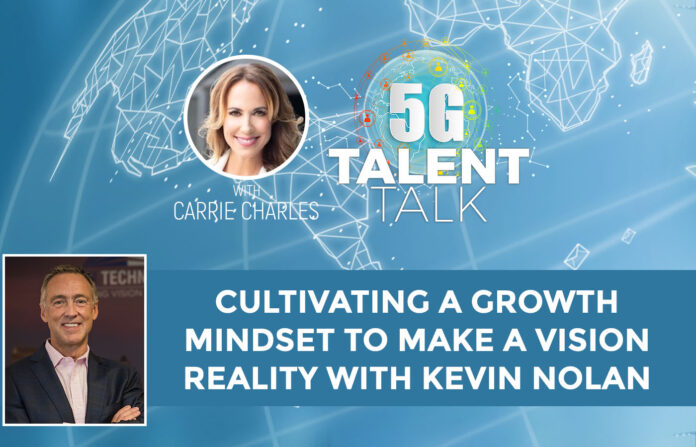The key to growth begins with strong leadership. Joining your host, Carrie Charles, is the President of Vision Technologies, Kevin Nolan. Over twenty years since its humble beginnings of starting in a garage, Vision Technologies now proudly holds its own, boasting nearly 600 employees with annual revenues exceeding $153.1M in 2021. The successes of Vision Technologies can be attributed to direction from leadership and the commitment to fostering an effective work culture. In this episode, Kevin describes the guidance necessary for an organization to thrive, and the style of operating with a growth mindset with a drive to achieve goals.
—
Watch the episode here
Listen to the podcast here
Cultivating a Growth Mindset to Make a Vision Reality with Kevin Nolan
I am very excited to introduce to you my guest for this episode, Kevin Nolan. He is the President of Vision Technologies. Kevin, thanks for joining me.
Thank you, Carrie. It is a pleasure to be here.
Kevin, I respect you so much as a leader. I want to hear a little bit more about your journey and how you got to the seat that you are in.
I was initially in the military. I was in the Air Force. When I got out of Air Force, I started working for an integrator in Virginia. I met this guy named John Shetrone. He and a couple of partners of his had a company in the ‘80s and ‘90s. I interviewed and I went to work for John. Back in those days in the ‘90s, ‘92 was when I started working for him. I wanted to be an engineer. I was doing things. I am going to date myself, but back then, you are configuring network management systems and operating systems. It was a small company and some of the teammates there started bringing up issues. They were sending me to John to bring up these issues.
It was that old Life commercial where they say, “Let’s get Mikey to do it.” I started talking to John about this, that, and the other thing. John started asking me, “What do you think?” Lo and behold, I did not realize it at the time because I was too young and naive, but one day he said to me, “Congratulations, you are going to be a manager.” I was like, “No, I am not doing that.” He saw something that I did not at the time.
That is how I got into management. In that company, I ran a department, I ran a business unit, and eventually, John and his partner sold the company. I took over for him after he left. That was ’97. Flash forward three years later, in 2000, he was retired. I talked him out of retirement to go into business with me and then we started Vision Technologies in 2000.

Tell me the story. I want to hear the story of Vision Technologies and a little bit about the industries you serve and your solutions.
A little story about Vision, it started in the garage. All IT companies have to start in a garage. It was rough going in the beginning. There were four of us, John, myself, and then we had two other partners. Almost before we got started, one partner got kidney disease and he had to exit the business. Six months into it, our CFO, who was 55 at the time, had a heart attack. We went from 4 to 3 to 2 real quick. 9/11 hit, so we are definitely looking at ourselves in the eye at that time. It was not the greatest time to start a company, but we persevered and did the typical entrepreneurial thing. We worked day and night.
Flash forward, we are about $200 million in revenue, 600-something teammates, plus another 100-something partners that we put on the street every day. We serve a plethora of converged technology. We are in physical security, audio, visual, Wi-Fi, DAS, or cellular reinforcement. We are also in cabling or infrastructure in a big way, and then last but not least, we have some government contracts where we do a classic IT outsourcing.
With all the industries that you serve, where do you see the greatest opportunity in the future?
I will say two things. If you think about the macro trends in society, everyone is mobile and wireless. We play there. All that data needs to be secured. Those networks need to be secured. All that prevalence of data is being stored in the cloud, which is really a sea of servers and data centers. We play there. Sometimes it is better to be more lucky than good. We are positioned technically in areas that are growing like hockey sticks and will continue to grow like hockey sticks far into the future, as we can see.
When you add on that, the theme of this show is 5G with the emergence and, eventually, over the next handful of years, maybe the prevalence of 5G. That is certainly going to create many more opportunities. All tech that we know of and things we cannot imagine, but as you know, there is wired and wireless. The density of those small cells, DAS, Wi-Fi, and WAPs, is going to increase dramatically and that is going to also fuel our growth.
Culture is investing in our teammates and growing our company because growth creates opportunity.
On everyone’s mind are retention, hiring, recruiting, workforce shortages, the future of work and what it looks like, and hybrid versus remote versus an office. That is the conversation we are hearing. I know that, at Vision, you have a strong company culture. I know that that helps you with all of those things that I mentioned. Tell me a bit about the culture at Vision.
The culture, first of all, is forged in John Shetrone’s DNA. He has always had a passion for great customer service. The way I frame it up is a Venn diagram that I put out there, which at the top is a world-class teammate experience. That is what we call our employees, teammates. World-class teammate experience, world-class customer experience, and world-class results, and that is how we focus with the intention of being the teammate on top.
In the service industry, if you do not have happy, invested, well-trained teammates, then you do not have a shot at providing good customer service. When you think about culture, it is making investments in our teammates, growing our company, not for the sake of growth, but growth creates opportunity. What we try to do and have tried to do since then is be a growth company so we can create jobs and we can build careers. What we try to do here is we are making massive investments in our people. It is everything from investments in HR, recruiting and staffing to Vision University.
We launched our first Vision Leadership Academy, which is specifically focused on investing in future leaders to develop a performance system. There is lots of technical training in our organization and career pathing. What we are trying to do here is create an environment where you can join Vision and you will spend next 5, 10, 15, 20 years here. Why would you want to? It is a great environment.
I sound a little prejudiced in that statement, but it is true. We have people that have been with us, even in John’s previous company, that are here for many years, predating this company to be with us for many years. Clearly, we have an environment where people like working with each other like serving our customers, but more importantly, it is a place where you can build your career. Whatever you want to achieve personally, professionally or economically, you could do it here. You do not have to jump companies to get where you want to go.
I believe that that is the secret sauce for the future of companies. It is to be able to serve a human being’s needs throughout their career path and throughout their life. I want to hear more about Vision University and then the leadership as well. What is Vision University and when was it created?

In our industry, you have always done technical training. You had to. We have dabbled in professional development and soft skills training, but years ago, I realized that we need to get way more formal in the soft side of it to develop our teammates, whether it is developing their customer service skills or developing their supervisory leadership skills. Vision University is a concept that I borrowed from others.
I am not claiming to create it, but there is nothing wrong with borrowing a good idea. Conceptually, it is like a university. Think of you going to a college university and you have different majors or different schools. It could be a school project management school, safety school of this technology or that technology, school leadership and a whole bunch of classes. There is a learning management system.
Kevin, tell me about the Vision Learning Management System because we are looking at that at Broadstaff too about putting something like that in place. Tell me about that.
We hired a person dedicated to that. We had the concept and we started building it out. We brought in a person to evaluate platforms and eventually shortlist and pick a platform and then launch the platform. With the platform you buy, you have a lot of training built in that comes with it, but then there is also a plethora of our custom classes and technical classes that go with it.
Whether it is technical training, web training, or customized leadership training that we may be doing in-house, all those things can be accessed by teammates through the portal. They could be tracked, whether tracking from a management perspective or a teammate being able to track their path and their career.
If you think about career pathing, certain certifications or classes that you want to go through or need to go through to prepare yourself, to get the next position up or the next promotion. It allows people to have a much greater hand in managing their own career by them knowing what the career path looks like, at least, from a training perspective and what training and certifications you need. There are other subjective things with your manager and leader, but it lets people be proactive and be as aggressive as they want to be in terms of getting themselves educated, making themselves more marketable, and working themselves into the next promotion opportunity.
People need to be proactive and aggressive as they want to be in terms of getting themselves educated and working themselves into the next promotion opportunity.
I could talk to you about that for hours. Tell me about you as a leader. Did your leadership style change over the years? Have you always had certain principles that guide you and that you live by? Talk about that for a minute.
I certainly changed over the years because I will admit that in my young days, I was not a good leader. I was more of a manager. In my young days, when I got put in my first management position, I was a Type A hard charger. I tried to drive everyone else to produce results. Being young and naive, I thought that was what it was about.
You flash forward 30 years, especially when we started Vision, and it is your own company and you are recruiting people to come join you. Some people did and some people did not. The people who did not, I learned some painful lessons that I was a taskmaster. That had a short shelf life. I think a combination of age and experience started to mature my leadership skills.
I have always had a natural curiosity and I have always wanted to learn. I have, but over the years, I had certainly learned to change the way I lead fundamentally. It is more about motivating, inspiring, investing in people, creating a culture, and creating an environment where they can grow, thrive and achieve what they want to achieve. My job primarily is to hire smart people and create an environment where they can succeed. Set expectations, get out of the way and let them do what they need to do, and be there to help them and give them guidance and coaching if I need to.
What you are committed to, has that changed any over the course of the pandemic with remote work versus hybrid versus in-office? The Great Resignation, there has been so much in our workforce that has changed. Have there been any changes in Vision Technologies due to that or maybe in your own way of leading?
One is longer than a pandemic, which is you go back to that taskmaster. There used to be a time when I was focused on competing and winning. It was a zero-sum game. Now I do not focus on competing and winning. I focus on me and us being a better version of ourselves. There is plenty of business to go around. The industry is growing. I think if we show up every day and we are our best selves, individually and as a team, we do great things for our customers, and we continue to try to learn and grow, we will be better tomorrow than we are today. I have a growth mindset rather than a task mindset or goal mindset. That is on the philosophy.

When you bring it into COVID, I think what we learned, like everyone did at the beginning of COVID, we are all rookies in leading through that unless you are 110 years old. What is interesting that we learned about COVID was it was not a business crisis, which we had been through a business and economic crisis before, but this was 24/7. It did not affect just people’s livelihoods, but it affected their lives. You had to ratchet up your connection and empathy, and that was made more difficult to do by the fact that we were not together anymore. We had to learn this Zoom thing that we are doing, which we take for granted every day.
Lots of challenges and lots of learning for all leaders everywhere went into that. We were in a situation where many of our people had to show up on customer sites every day. They never had the opportunity and did not have the opportunity in the service organization to be remote. We did a good job. Our team did a good job putting health safety protocols into place and scouring the globe to find, back in those days, sanitizers, wipes, and masks. When you think about the hybrid workforce, I think it’s here to stay. I think we are navigating through the situation where people want to connect.
Humans are natural connectors. That, combined with what we have been used to, some people do not want to come back in the office. Some people have in their head the commute, a lack of productive time, etc. We are not forcing an issue. We do not have a quota or anything, but we are trying to ease people back into the office by creating environments and situations that give people a reason to come here, not just show up here and work in your cube versus work at home. That could be simple things like fun things like cookouts. It could be work-related things like staff meetings. What we are trying to manufacture are opportunities that make people want to come into the office and have a purpose to come to the office. That is where we’re at.
In fact, we have had a situation here where people do not want to leave the office. We have got a limited amount of space because I did not get more space. I thought, “We are not going to need it. We are going to have such a large remote team.” We have so many people that want to be in the office and be together that we are struggling with space issues. I agree with you on creating an environment, whether it is remote or an office, where people want to be. Having that growth mindset is so important.
Everything you have said to me resonates and is spot on with how to build the workforce of the future, people-centric, putting people first, and that is what matters. That is what you are doing at Vision. Let’s talk about the future, the vision of Vision. Let’s look at where Vision will be in the future. What are some exciting projects you are working on and some things you can share with us?
From a project perspective, this is where I might get in trouble from an NDA perspective. We have won some really big projects that we are doing, HQ2 for the big-box store that is in our local area in Northern Virginia, lots of data center projects. I cannot name some of those names, but they are big hyper scales that most of us are familiar with. As far as what our future looks like, we are in the technology space that continues to grow. I think things like 5G, IoT, intelligent buildings, intelligent campuses, and smart warehousing are going to continue to drive our growth.
Don’t focus on competing and winning. Focus on yourself and your people to develop and become better versions of themselves. There’s plenty of business to go around, and the industry’s growing.
We are trying to grow and create those opportunities for people. We have an organic growth strategy. We have an acquisition growth strategy. On top of that, I am trying to make massive investments in our people because I do not want to outstrip our ability to deliver. I am also making big investments in our leadership. You definitely need good leadership. Vision is a national company, so we are going to continue to expand in the regions we are in and expand into more regions. Our national growth is going to increase in our future.
In order to do that, we need to keep making. I am making multimillion-dollar investments year over year in our leadership, our people, our frontline supervisors, and our frontline leadership. That is all about being able to put the best team on the field to service our customers to continue to fuel that growth and create opportunities for people.
That is exactly where leaders need to be and for the future. It is investing in your people. Throughout this entire interview, you have come back over and over to investments in people and growth. It is interesting because you have even said, “We are doing this to create opportunities for our people.” This has been such a beautiful message.
I think it is something that people all over the world are looking for, that type of culture and those types of leaders that are going to have these things top of mind. I want to thank you for coming on the show. This has been delightful. I have learned a lot from you. I might borrow just a few things from you, if you do not mind. I will give you credit. I promise.
Do not give me credit because most things I do are borrowed from someone else.
Where can we go to learn more about Vision Technologies and also careers?
VisionTechonologies.com. You can go to our website. We have a careers page there. We are hiring in various parts of the country for all kinds of positions. If you like what you see or you have heard about us and you want to join our team, please check us out on the website and come join us.
This has been wonderful. Thank you. I really enjoyed it. We will talk very soon, I am sure. You take care.
I told you off the air, but I do enjoy your show. It is a great show. It is very educational. We are not only learning about the wireless network and things that are in the future, but learning from a lot of great leaders you have had on. Thank you.
Thank you. That means a lot. We will talk very soon. I appreciate you, Kevin.
Important Links
Love the show? Subscribe, rate, review, and share!
Join the 5G Talent Talk Community today:

